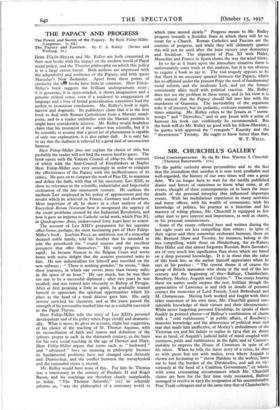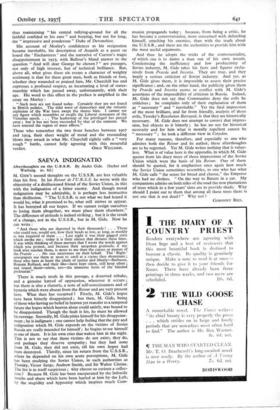MR. CHURCHILL'S GALLERY
Great Contemporaries. By the Rt. Hon. Winston S. Churchill. (Thornton Butterworth. 21s.) To the public curiosity about personalities and to the fact that the journalism that satisfies it is now both profitable and well-regarded, the history of our own times will owe a great debt. We no longer have to wait for the tardily published diaries and letters of statesmen to know what some, at all events, thought of their contemporaries or to learn the inner details of the personal interplay that influenced important events. With his multifarious experience in many activities and many offices, With his wealth of connexions, with his knowledge of politics, his practice as a historian and his mastery of telling phrase, Mr. Churchill is equipped as few Other men to give interest and importance, as well as charm, to his personal reminiscences.
Some of the essays collected here and written during the last eight years are less compelling than others : in spite of their vigour and their somewhat exuberant humour, those on Mr. Bernard Shaw and Trotsky, for instance, belong to the less compelling, while those on Hindenburg, the ex-Kaiser, Herr Hitler and that almost forgotten Russian, Boris Savinkov, are of very much less significance than those which are based on a deep personal knowledge. It is in these that the value of this book lies, as the author himself appreciates when he says in his preface : "The central theme is of course the group of British statesmen who shone at the end of the last century and the beginning of this—Balfour, Chamberlain, Rosebery, Morley, Asquith and Curzon." The essays bearing these six names easily surpass the rest, brilliant though the appreciation -of Lawrence is and rich in details of personal contact the memories- of Lord French, Lord Birkenhead and M. Clemenceau. Having both worked and fought with these elder statesmen of his own time, Mr. Churchill gained con- siderable knowledge of their virtues and their idiosyncrasies. While never forgetting personal friendship, he speaks of them frankly in pointed phrase—of Balfour's combination of charm with a "cold ruthlessness" in public affairs, of Rosebery's immense knowledge and the abhorrence of political wear and tear that made him ineffective, of Morley's embodiment of the Victorian era_ and his failure to realise in 1914 that its doom was at hand, of Asquith's judicial habit of mind coupled with sternness, pride and ruthlessness in the fight, and of Curzon's inability to impress the House of Commons in spite of all his talent. When he tells the inner story of a crisis, he does so with gusto but not with malice, even where Asquith is shown not hesitating to "throw Haldane to the wolves, leave me to bear the burden of the Dardanelles, and sail on vic- toriously at the head of a Coalition Government," or where, with some extenuating circumstances which Mr. Churchill claims are here for the first time truly recounted, Balfour managed to receive in 1903 the resignation of his uncomfortably Free Trade colleagues and at the same time that of Chamberlain, thus maintaining "his central rallying-ground for all the
faithful confided to his care" and keeping, but not for long, the "impressive and ponderous" Duke of Devonshire.
His account of Morley's confidences as his resignation became inevitable, his description of Asquith as a guest on board the ' Enchantress ' and the narrative of Curzon's tragic disappointment in 1923, with Balfour's bland answer to the question "And will dear George be chosen ? " are passages, not only of high interest, but of technical brilliance. But, above all, what gives these six essays a character of weighty testimony is that for these great men, both as friends or foes, whether they wounded or praised him, Mr. Churchill has and expresses a profound respect, as incarnating a level of states- manship which has passed away, unfortunately, with their age. His word to this effect in the preface is amplified in the essay on Morley :
"Such men are not found today. Certainly they are not found in British politics. The tidal wave of democracy and the volcanic explosion of the War have swept the shores bare. I cannot see any figure which resembles or recalls the Liberal statesmen of the Victorian epoch. . . . The leadership of the privileged has passed away ; but it has not been succeeded by that of the eminent. We have entered the region of mass effects.'
Those who remember the two front benches between 1907 and 1914, their sheer weight of metal and the resounding blows they struck in what Mr. Churchill rightly calls a "very rough" battle, cannot help agreeing with this mournful























































 Previous page
Previous page